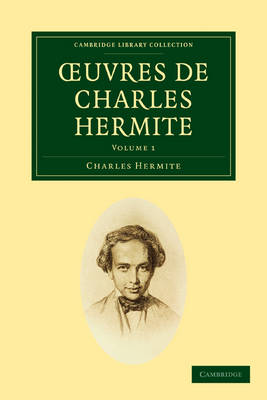Cambridge Library Collection - Mathematics
4 primary works • 5 total works
Volume 1
Charles Hermite (1822-1901) was a French mathematician who made significant contributions to pure mathematics, and especially to number theory and algebra. In 1858 he solved the equation of the fifth degree by elliptic functions, and in 1873 he proved that e (the base of natural logarithms) is transcendental. The legacy of his work can be shown in the large number of mathematical terms which bear the adjective 'Hermitian'. As a teacher at the Ecole Polytechnique, the Faculte des Sciences de Paris and the Ecole Normale Superieure he was influential and inspiring to a new generation of scientists in many disciplines. The four volumes of his collected papers were published between 1905 and 1908.
Volume 2
Charles Hermite (1822-1901) was a French mathematician who made significant contributions to pure mathematics, and especially to number theory and algebra. In 1858 he solved the equation of the fifth degree by elliptic functions, and in 1873 he proved that e (the base of natural logarithms) is transcendental. The legacy of his work can be shown in the large number of mathematical terms which bear the adjective 'Hermitian'. As a teacher at the Ecole Polytechnique, the Faculte des Sciences de Paris and the Ecole Normale Superieure he was influential and inspiring to a new generation of scientists in many disciplines. The four volumes of his collected papers were published between 1905 and 1908.
Volume 3
Charles Hermite (1822-1901) was a French mathematician who made significant contributions to pure mathematics, and especially to number theory and algebra. In 1858 he solved the equation of the fifth degree by elliptic functions, and in 1873 he proved that e (the base of natural logarithms) is transcendental. The legacy of his work can be shown in the large number of mathematical terms which bear the adjective 'Hermitian'. As a teacher at the Ecole Polytechnique, the Faculte des Sciences de Paris and the Ecole Normale Superieure he was influential and inspiring to a new generation of scientists in many disciplines. The four volumes of his collected papers were published between 1905 and 1908.
Volume 4
Charles Hermite (1822-1901) was a French mathematician who made significant contributions to pure mathematics, and especially to number theory and algebra. In 1858 he solved the equation of the fifth degree by elliptic functions, and in 1873 he proved that e (the base of natural logarithms) is transcendental. The legacy of his work can be shown in the large number of mathematical terms which bear the adjective 'Hermitian'. As a teacher at the Ecole Polytechnique, the Faculte des Sciences de Paris and the Ecole Normale Superieure he was influential and inspiring to a new generation of scientists in many disciplines. The four volumes of his collected papers were published between 1905 and 1908.
Charles Hermite (1822-1901) was a French mathematician who made significant contributions to pure mathematics, and especially to number theory and algebra. In 1858 he solved the equation of the fifth degree by elliptic functions, and in 1873 he proved that e (the base of natural logarithms) is transcendental. The legacy of his work can be shown in the large number of mathematical terms which bear the adjective 'Hermitian'. As a teacher at the Ecole Polytechnique, the Faculte des Sciences de Paris and the Ecole Normale Superieure he was influential and inspiring to a new generation of scientists in many disciplines. The four volumes of his collected papers were published between 1905 and 1908.

